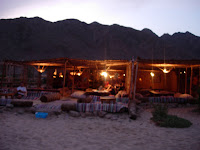 What better way to complete a solo vacation than to be able to dedicate specific moments to specific people? Thanks to Nancy's friends, you find yourself doing a Breast Cancer Awareness walk at the Pyramids, a far cry from Central Park. There are groups of people from all over the world, of every age, and everyone has a friend or relative to whom they are dedicating this hot, dusty, dry day. You think of someone back in the USA and imagine her walking with you, head held high, one deliberate step after another, admiring the Pyramids and casting aside her sickness to be a strength to you and everyone around her.
What better way to complete a solo vacation than to be able to dedicate specific moments to specific people? Thanks to Nancy's friends, you find yourself doing a Breast Cancer Awareness walk at the Pyramids, a far cry from Central Park. There are groups of people from all over the world, of every age, and everyone has a friend or relative to whom they are dedicating this hot, dusty, dry day. You think of someone back in the USA and imagine her walking with you, head held high, one deliberate step after another, admiring the Pyramids and casting aside her sickness to be a strength to you and everyone around her. Sameer, of earlier posts, takes you on a drive through Cairo in his trusty, beat-up car -- the Batmobile, he calls it with his ineffable grin. You leave the traffic for the quiet of a mountain where the Zabbaleen live -- the Coptic Christian community of Egypt who collect the city's trash, and there is a lot in this crowded metropolis. You drive slowly through the hill, stopping to let people pass, they are hauling large bags into small godowns. The trash used to be fed to the pigs who crawled the hills, but the Swine Flu induced a nervous Muslim (and, so, anti-pig) government to kill most of them off. At the top is a beautiful church carved out of the mountain rock, and you have a quick cup of tea before going inside for respite from the dust and dirt further down the mountain. You leave the dark streets and the soot-covered men sucking slowly on hookahs for the Christianity that glows at this higher, more pristine altitude. The church is empty but peace echoes through the cave. In an adjacent outdoor auditorium, some sort of class is being conducted for young children who listen avidly to their teacher speaking about Jesus Christ. You think of someone back in the USA and imagine him walking with you, keenly and quietly observing each carving and painting, drawing strength from it as you draw strength from him.
Sameer, of earlier posts, takes you on a drive through Cairo in his trusty, beat-up car -- the Batmobile, he calls it with his ineffable grin. You leave the traffic for the quiet of a mountain where the Zabbaleen live -- the Coptic Christian community of Egypt who collect the city's trash, and there is a lot in this crowded metropolis. You drive slowly through the hill, stopping to let people pass, they are hauling large bags into small godowns. The trash used to be fed to the pigs who crawled the hills, but the Swine Flu induced a nervous Muslim (and, so, anti-pig) government to kill most of them off. At the top is a beautiful church carved out of the mountain rock, and you have a quick cup of tea before going inside for respite from the dust and dirt further down the mountain. You leave the dark streets and the soot-covered men sucking slowly on hookahs for the Christianity that glows at this higher, more pristine altitude. The church is empty but peace echoes through the cave. In an adjacent outdoor auditorium, some sort of class is being conducted for young children who listen avidly to their teacher speaking about Jesus Christ. You think of someone back in the USA and imagine him walking with you, keenly and quietly observing each carving and painting, drawing strength from it as you draw strength from him. It is your last night and the Nile laps at you, asking you to stay a little longer -- or so you hope she is saying, anyway. Men still stare and call out to you, one walks directly in front of you, cutting you off, making you stumble. You laugh it off -- you've made it this far, seen shooting stars in a desert, lunched in a local's home, drank the freshest mint tea, slept sitting up in a train, hitch hiked with a complete stranger, lost and found your way back to Cairo, been scammed by taxi drivers and used your 10 words of Arabic to get around. This moment is dedicated to your father who was bitten by the travel bug long before you showed up, and successfully infected you and your siblings to continue wandering, discovering, reveling.
It is your last night and the Nile laps at you, asking you to stay a little longer -- or so you hope she is saying, anyway. Men still stare and call out to you, one walks directly in front of you, cutting you off, making you stumble. You laugh it off -- you've made it this far, seen shooting stars in a desert, lunched in a local's home, drank the freshest mint tea, slept sitting up in a train, hitch hiked with a complete stranger, lost and found your way back to Cairo, been scammed by taxi drivers and used your 10 words of Arabic to get around. This moment is dedicated to your father who was bitten by the travel bug long before you showed up, and successfully infected you and your siblings to continue wandering, discovering, reveling.Inshallah.























